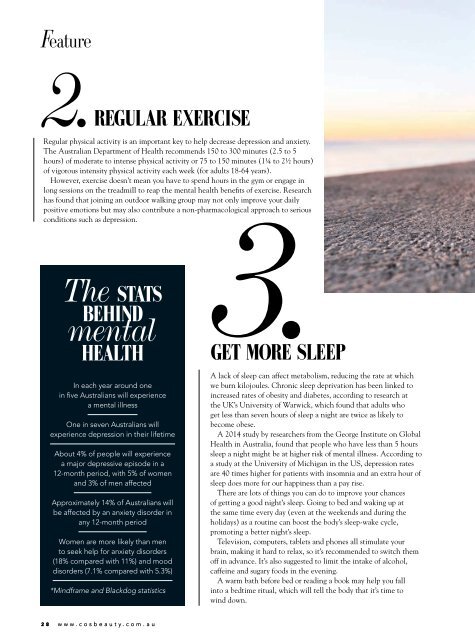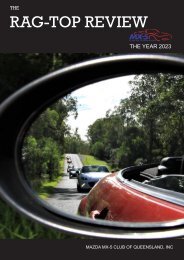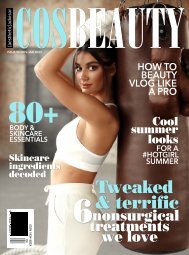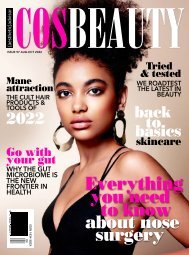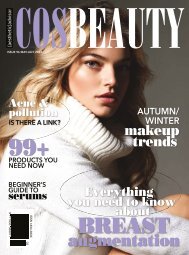CosBeauty Magazine #78
CosBeauty is the #BeautyAddict's guide to lifestyle, health and beauty in Australia. This issue we look at 60+ products to step up your party makeup, our Christmas Gift guide, 10 makeup hacks every girl should know, and our 10 page feature - Face First; look your best without going under the knife.
CosBeauty is the #BeautyAddict's guide to lifestyle, health and beauty in Australia. This issue we look at 60+ products to step up your party makeup, our Christmas Gift guide, 10 makeup hacks every girl should know, and our 10 page feature - Face First; look your best without going under the knife.
Create successful ePaper yourself
Turn your PDF publications into a flip-book with our unique Google optimized e-Paper software.
Feature<br />
2.Regular exercise<br />
Regular physical activity is an important key to help decrease depression and anxiety.<br />
The Australian Department of Health recommends 150 to 300 minutes (2.5 to 5<br />
hours) of moderate to intense physical activity or 75 to 150 minutes (1¼ to 2½ hours)<br />
of vigorous intensity physical activity each week (for adults 18-64 years).<br />
However, exercise doesn’t mean you have to spend hours in the gym or engage in<br />
long sessions on the treadmill to reap the mental health benefits of exercise. Research<br />
has found that joining an outdoor walking group may not only improve your daily<br />
positive emotions but may also contribute a non-pharmacological approach to serious<br />
conditions such as depression.<br />
The stats<br />
behind<br />
mental<br />
health<br />
In each year around one<br />
in five Australians will experience<br />
a mental illness<br />
One in seven Australians will<br />
experience depression in their lifetime<br />
About 4% of people will experience<br />
a major depressive episode in a<br />
12-month period, with 5% of women<br />
and 3% of men affected<br />
Approximately 14% of Australians will<br />
be affected by an anxiety disorder in<br />
any 12-month period<br />
Women are more likely than men<br />
to seek help for anxiety disorders<br />
(18% compared with 11%) and mood<br />
disorders (7.1% compared with 5.3%)<br />
*Mindframe and Blackdog statistics<br />
3.<br />
Get more sleep<br />
A lack of sleep can affect metabolism, reducing the rate at which<br />
we burn kilojoules. Chronic sleep deprivation has been linked to<br />
increased rates of obesity and diabetes, according to research at<br />
the UK’s University of Warwick, which found that adults who<br />
get less than seven hours of sleep a night are twice as likely to<br />
become obese.<br />
A 2014 study by researchers from the George Institute on Global<br />
Health in Australia, found that people who have less than 5 hours<br />
sleep a night might be at higher risk of mental illness. According to<br />
a study at the University of Michigan in the US, depression rates<br />
are 40 times higher for patients with insomnia and an extra hour of<br />
sleep does more for our happiness than a pay rise.<br />
There are lots of things you can do to improve your chances<br />
of getting a good night’s sleep. Going to bed and waking up at<br />
the same time every day (even at the weekends and during the<br />
holidays) as a routine can boost the body’s sleep-wake cycle,<br />
promoting a better night’s sleep.<br />
Television, computers, tablets and phones all stimulate your<br />
brain, making it hard to relax, so it’s recommended to switch them<br />
off in advance. It’s also suggested to limit the intake of alcohol,<br />
caffeine and sugary foods in the evening.<br />
A warm bath before bed or reading a book may help you fall<br />
into a bedtime ritual, which will tell the body that it’s time to<br />
wind down.<br />
28 www.cosbeauty.com.au


